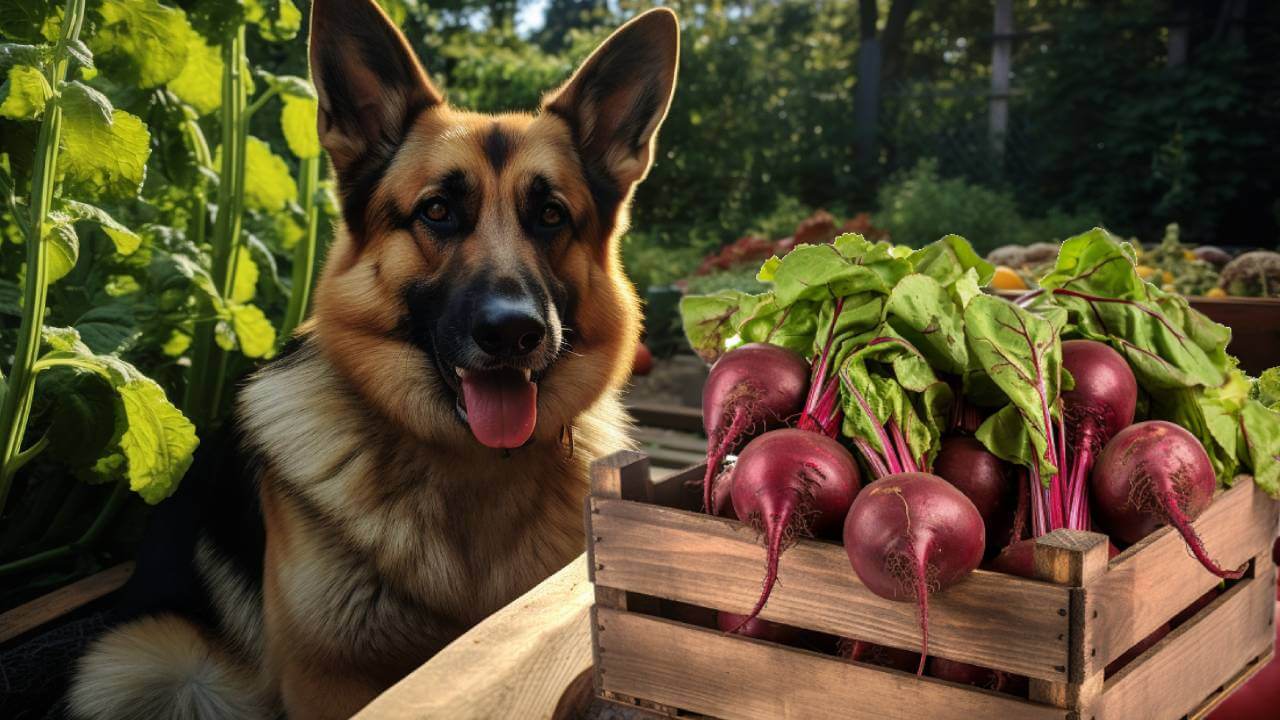In the world of canine nutrition, including vegetables in a dog’s diet has always been a subject of curiosity and debate. In their quest to offer their dogs a balanced and diverse diet, many pet owners wonder about the safety and benefits of various vegetables.
One such vegetable is the beet. “Can dogs eat beets?” is a question that resonates in many dog-loving communities. This comprehensive guide addresses this query and delves deeper into the multifaceted benefits and precautions surrounding beet consumption for dogs.
Can Dogs Safely Eat Beets in Their Diet? Cooked Or Raw
To start, dogs can indeed safely eat beets. Beets are non-toxic and generally safe for canine consumption, whether you serve them cooked or raw.
However, moderation is paramount, as with any food outside their regular dog food. Introducing beets slowly and as a supplementary treat rather than a main component is a sensible approach.
Health Advantages of Consuming Beets
Beets are not just any ordinary root vegetable; they are a veritable nutritional goldmine:
- Rich in Antioxidants: These molecules neutralize free radicals, potentially reducing the risk of chronic illnesses and improving overall health.
- High Fiber Content: The fiber in beets aids digestion, helps maintain bowel regularity, and supports a flourishing gut microbiome.
- Packed with Vitamins and Minerals: Beets are a treasure trove of vitamins, including A, B, and C, and are rich in minerals such as potassium, magnesium, and iron.
Beets and Oral Health in Dogs
Feeding raw beets to dogs can come with an added dental advantage:
- Combatting Tartar Build-up: The hardness and texture of raw beets can serve as a natural tooth-cleaning mechanism, gently scraping off tartar.
- Gum Stimulation: Chewing raw beets promotes blood flow to the gums, fostering healthier oral tissue and potentially staving off dental issues.
Understanding the Color Change Due to Consuming Beet
A unique, albeit harmless, repercussion of beet consumption in dogs is a change in the color of their urine and feces. Shades ranging from pink to deep purple are standard.
While harmless, pet owners must be aware of the change in their dog’s urine color from consuming beet. However, any color change accompanied by other unusual symptoms necessitates a veterinary consultation.
Raw vs. Cooked: What’s the Ideal Way?
Beets can be fed to dogs in various forms:
- Raw Beets: They are crunchy and can assist in dental health. Finely chopping or grating them is recommended for easier digestion and to prevent choking, especially in smaller breeds.
- Cooked Beets: Cooking (boiling or steaming) softens beets, making them more palatable and easier to digest. Seasonings, however, should be avoided as many can harm dogs.

Can They Consume Beet Skin?
Yes, the outer layer or skin of the beet is safe for dogs. Ensure thorough washing to eliminate potential pesticides or contaminants. If there’s uncertainty about the beet’s origin, peeling is a more cautious approach.
Is It Safe to Eat Beets Daily?
While beets offer numerous health benefits, they shouldn’t become a daily dietary staple. Daily servings can lead to consistent color changes in excretions and might upset the dietary balance if given in large quantities.
Hydration and Beets
High in water content, beets contribute to a dog’s hydration. Especially during hot weather, water-rich foods like beets can complement regular water consumption, aiding in overall hydration and temperature regulation.
How to Prepare Beets for Your Dog
- Washing: Meticulously wash beets to remove dirt or potential chemical residues.
- Cutting: Dice or shred beets based on your dog’s size and preference.
- Cooking: If you cook, steaming or boiling without additives is the best method. Cool them down to room temperature before serving.
Conclusion
Incorporating beets into a dog’s diet can be nutritionally enriching. However, as with any new food introduction, observing reactions, consulting with veterinarians, and ensuring moderation will guarantee the well-being and happiness of our beloved canine companions.
FAQs

Do beets have any allergenic properties for dogs?
While beets are generally safe for dogs, just like any other food, there’s a slight chance your dog could have an allergic reaction. After introducing new food, always monitor for signs like itching, swelling, or difficulty breathing.
Can puppies eat beets, or is it suitable only for adult dogs?
Puppies can eat beets but should be introduced slowly and in smaller quantities. Ensuring they’re appropriately sized (finely chopped or mashed) is essential to avoid choking hazards.
How often should I give my dog beets as a treat?
While beets are nutritious, they should be considered an occasional treat. Serving them once or twice a week is an excellent general guideline.
Are there any potential digestive issues that beets might cause in dogs?
Some dogs might experience gas or mild digestive upset if they consume too much beets. Starting with a small amount and monitoring your dog’s reaction is advisable.
Are beet leaves or greens safe for dogs?
Beet greens are safe in moderation. However, they contain higher levels of oxalates, which, in large amounts, can be harmful. Feeding them sparingly is best to ensure they’re washed and cooked.
Do beets contribute to weight gain in dogs?
Beets are low in calories and fat. However, like any treat, they should be given in moderation and factored into the dog’s daily caloric intake to maintain a healthy weight.
Are there any specific beet varieties to avoid for dogs?
Most common beet varieties (red, golden, or striped) are safe for dogs. Always ensure they’re fresh and free from molds or signs of spoilage before serving.






my dogo was never interested in beets
thanks for the article
I’ve read conflicting opinions about dogs and beets